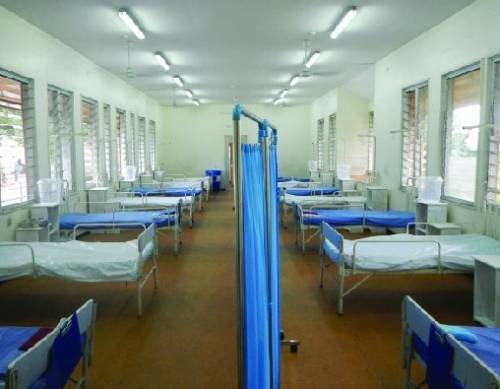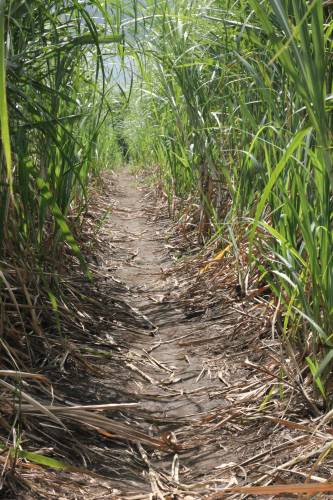By Valery Nodem | Presbyterian Hunger Program

The highest navigable lake in the world, Lake Titicaca, at the border between Bolivia and Peru, faces various threats because of tourism, overfishing and pollution. Photo by Valery Nodem.
The whole world has come to a pause over the last 2 months as the Coronavirus hit almost all countries on the planet. From just a few hundred people infected in January, there are currently more than two and half million cases around the world. The message across countries has been the same: wash hands regularly, practice social distancing, cover coughs and sneezes, wear a mask, and clean and disinfect frequently touched surfaces.
For those living in the United States, the richest country in the world, most of these measures have been hard to apply, as COVID-19 has taken everyone by surprise, and has drastically changed the way people live their lives.
Many things that we have always taken for granted like hand sanitizers, toilet paper, masks, and gloves have become extremely hard to find. Testing was delayed in the U.S. and still is not broadly available. States are still trying to secure much needed ventilators and Personal Protective Equipment. 22 Million people have filed unemployment over the past 4 weeks, a historic record. According to the Centers for Disease Control, more than 746,000 people have been confirmed positive and more than 39,000 people have died as of today.
If COVID-19 has had all these drastic consequences for the United States, what will be the impacts for countries in the developing world that do not have the resources that wealthier countries like the United States have?
Since COVID-19 began spreading, we have been in touch with our partners around the world to find out how they are doing, how their countries and communities are responding to the pandemic, and how we can be of help in these challenging times. The stories we have heard are breathtaking.
In  most countries where we work, social distancing is a real challenge, and seems impossible for most poor families. Many economies are informal, or gig economies, and people rely on going out and making the money that will help the family to get food on that specific day. According to our partner from CISCOPE in Nigeria, Peter Egwudah, “For most communities, it seems like the choice is to die from Coronavirus or die from hunger.”
most countries where we work, social distancing is a real challenge, and seems impossible for most poor families. Many economies are informal, or gig economies, and people rely on going out and making the money that will help the family to get food on that specific day. According to our partner from CISCOPE in Nigeria, Peter Egwudah, “For most communities, it seems like the choice is to die from Coronavirus or die from hunger.”
The response from most governments has been very slow, and very late. Many countries do not have adequate capacities to respond to the crisis. A country like South Sudan, with more than 12 million people, has only been able to run 70 tests so far, with 4 confirmed cases. Devastated by years of civil war, the country only has 24 isolation beds, and is not prepared if COVID-19 infects large numbers of the population.
Inflation has gone up rapidly in many countries, and food and essentials are not affordable for the very poor and marginalized communities. Since many borders have been closed, countries and communities that were reliant on imported food and goods have had to pay a higher price, as supplies have decreased, and it takes longer for these goods to be available in stores. Jaff Bamenjo, the Coordinator of RELUFA, the Joining Hands network in Cameroon, shared that since his country closed its borders and also suspended the importation of animal and fisheries products from countries affected by the pandemic, the prices of these products have soared in local markets, and the majority of the population is not able to afford them.
In the United States and in many developed countries, governments have announced a set of measures that will help relaunch their economies, support families in need and help the private sector get back on its feet. However, very few developing countries are able to provide such support or additional resources to people confined at home and unable to work.
The need for social distancing has meant that humanitarian and other development workers are not able to continue the work they do in close proximity with the poorest communities. This means that frontline communities, “the least of these” (reference to Matthew 25) risk being abandoned and left without the urgent assistance needed in the middle of this pandemic.

Workers in sugarcane plantations in El Salvador work very long hours, use lots of pesticides and receive little pay. Many suffer from Chronic Kidney Disease. They are organizing to improve their working and living conditions, and to reduce the use of pesticides in agriculture. Photo by Valery Nodem.
The good news is that a lot of our partner organizations are respecting health protocols and recommendations but are also not leaving the field and abandoning local communities. PHP is discussing with partner organizations to see if some of the original funded projects need to be modified so that organizations can respond to pressing needs created by COVID-19. Paul Raja Rao, the Director of BIRDS in India is working on COVID-19 in villages where they are constructing toilets with funding from PHP. They are planning to provide sanitizers, masks and food supplies to daily wage laborers, and looking for more resources to extend their work. Their plan is to work in 25 villages and add the 80 villages that are covered by another PHP partner, Chethana, in South India. BIRDS is also targeting older and sick people with their operation.
Red Uniendos Manos Peru, the Joining Hands network in Peru, is developing plans to support Venezuelan refugees in Peru. More than 210,000 refugees and migrants have found themselves in a highly vulnerable situation as they have no access to the government’s financial subsidies. Venezuelan migrants in the city of Lima constitute a disadvantaged population due to their precarious status and options in Peru. Refugees and migrants often have underlying health problems stemming from poor nutrition, poor housing conditions, or prolonged lack of access to healthcare due to health systems having collapsed in their country of origin and limitations of access to the health service in the host country. These conditions place them in a situation of greater vulnerability to COVID-19. Red Uniendos Manos Peru’s plan is to reduce the risk of the spread of Covid-19 amongst these vulnerable families and to improve their stability.
This COVID-19 crisis is teaching us many lessons. The first one is that we are all in the same boat. Rich and poor are all able to catch it. Industrialized and non-industrialized countries are exposed and suffering. White people and people of color; men and women. All of a sudden, social status and class doesn’t seem to matter. May we see and realize that and break barriers that divide us and create us vs them. We need to do better to be our brothers’ keepers. May we open our door to the sick and the oppressed and speak for those who cannot speak.
Another lesson is that change is possible if we want it to happen and work for it. For decades, there have been conversations about reducing our consumption and carbon footprint, and that seemed to never happen. Just a few months after we’ve all been confined to our houses, pollution has dropped significantly in many parts of the world where people rarely could see the blue sky or mountain ridges. In many places, wild animals are roaming wild again. With fewer cars on the road and fewer factories open, we are giving the planet a much-needed rest and an opportunity for healing.
May we come out of this with more respect for nature and for all its creatures. May we be reminded that we are the stewards of creation, not its owners. May we be encouraged to continue our fight for justice because we know change is possible and it is our call.
The work of the Presbyterian Hunger Program is possible thanks to your gifts to One Great Hour of Sharing.